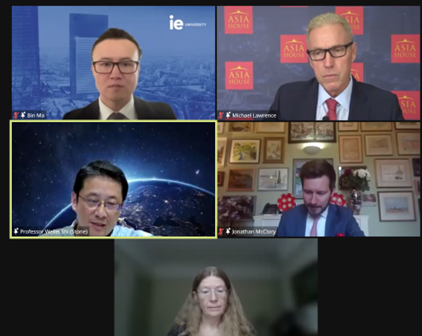Driving commercial and political engagement between Asia, the Middle East and Europe
Driving commercial and political engagement between Asia, the Middle East and Europe
Driving commercial and political engagement between Asia, the Middle East and Europe

Asia House, in partnership with Cheung Kong Graduate School of Business (CKGSB) and IE China Center, hosted a digital conference on the pivotal role high-tech companies play in influencing a nation’s soft power. This conference brought together senior business executives and policy experts from all over the world. The conference also served as a launch event for the report ‘Fuel the Soft Power: The Role of High Tech Companies in the Soft Power Rivalry between China and United States’, co-produced by IE University and CKGSB.
Michael Lawrence OBE, Chief Executive of Asia House, opened the session by introducing the concept of soft power and summarising the main findings of the report. High-tech companies are crucial in enhancing a nation’s soft power and harnessing a company’s branding and products can shape international relations and drive trade and economic growth.
A keynote speech was delivered by Dr Sean Randolph, Senior Director at Bay Area Council Economic Institute. He pointed out that many of the world’s most valuable companies are technology-based, particularly in Silicon Valley, and these technologies positively impact people’s lives through connecting people worldwide. Furthermore, he highlighted the economic impact of technology, citing job creation and technological development, as well as its role in deepening mutual ties between countries. Dr. Randolph concluded by emphasizing that, as the global economy digitizes, access to technology will determine a country’s prosperity and competitiveness.
Ma Bin, Academic Director of IE China Center, presented the key findings from the report which covered soft power across three elements: culture and values, education and science, and business and economy. The United States maintains a long-established dominance in soft power. However, emerging economies are increasingly recognising the contributions of Chinese businesses on a global stage as well as Chinese advancements in education and science. High-tech companies play a key role; companies like Apple and Samsung are seen as strong representatives of their home countries’ culture and image and they are highly familiar, influencing global consumption. Chinese tech companies like Huawei and TikTok, while not at the same level, are steadily improving their representation of Chinese values and culture.

A panel discussion followed in which representatives from the IE China Center, CKGSB, the British Council and Sanctuary Counsel discussed soft power in relation to how it’s changing and impacted by geopolitical tensions. Jonathan McClory, Partner at Sanctuary Counsel, highlighted that the pandemic has shifted the importance of factors that contribute to a country’s soft power and while arts, culture, and tourism are still important, attributes like government performance, scientific innovation and technological capability have gained prominence. Mona Lotten, Head of Soft Power Research and Insight at The British Council referred to the survey data that captures the perceptions of young people from G20 countries. Generally, high-income Western democracies with advanced technology sectors tend to perform well in terms of attributes of soft power, whilst South Korea has demonstrated significant improvements in audience perceptions. Shi Weilei, Professor of Managerial Practice at CKGSB, discussed how China has historically possessed regional soft power, primarily influencing nearby countries; however, as China’s economy grows, its soft power is extending to a global level, as companies like TikTok and Shein cater to international audiences.
The conference welcomed over 110 attendees online and provided valuable insight into the importance of soft power and the perceptions of different companies and countries. Watch the event recording here.
Find out more about the benefits of Corporate Membership at Asia House.
